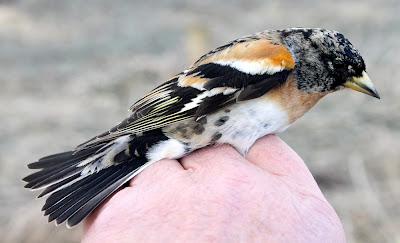A quick look at Fluke Hall this morning revealed not a lot happening on the migration scene again. A Chiffchaff in the same stretch of hedgerow as on Wednesday, a dozen or so Pied Wagtails and 5 Meadow Pipits at the midden, one of the resident Mistle Thrushes, and then close-by a Sparrowhawk dashing along the ditches. So the rest of this post is devoted to Thursday morning's ringing and birding Out Rawcliffe way.
The early 6am start meant I got to watch the local Barn Owl pair hunting before the fields became busy with the noise and activity of Spring tractors; ringers are often up and about before farmers but don’t have the staying power to work the fields as quickly or effectively as two Barn Owls or a John Deere.
The nagging and bitterly cold easterly wind finally relented for just a few hours, enough to have a crack at the feeding station. The owls had my attention for a good thirty minutes, saving me from the cold until a few birds appeared in the nets to keep icy hands busy, but then as early as 0930 the wind re-energised itself and forced an end to my heroics.
Fifteen birds caught - 11 new and 4 recaptures. New birds; 3 Brambling, 3 Reed Bunting, 2 Goldfinch, 2 Chaffinch and in the only sign of Spring arrivals, a single Goldcrest. The recaptures were 3 Brambling from recent weeks and 1 Chaffinch. The female Chaffinch was first ringed here in 2007 as a juvenile, recaptured in 2009 but no other captures until today, with the bird now a respectable age for a Chaffinch. While Chaffinches can live to 10 or 12 years of age their average lifespan is much shorter with only a very few fledglings surviving their first winter.
Chaffinch
The migratory Goldcrest is the smallest British bird, almost always weighing in somewhere between 5 and 5.5 grams, with this morning’s example proving something of a heavyweight at 6.3 grams but still less than a ten-pence coin which tips the scales at 6.5.
Goldcrest
Ten Pence coin
From recent visits to the moss I reckoned the regular Bramblings numbered 10 or 12, always around the seed drop zone, scattering far and wide into the trees as soon as look at them, so catching six today confirms the suspected number as a likely guess.
Brambling
Brambling
Still the Reed Buntings surprise with a daily and continual turnover of new birds and three more second calendar year males today.
Reed Bunting
Maybe the other sign of Spring was 14 Fieldfare heading noisily north, or perhaps the flock of Golden Plover, 90+ strong, black faces and black bellies, some in fluty song, even though they stayed put on the stubble field with more than 100 Curlew. A few of the Curlews bubbled up too, but just like the goldies didn’t go anywhere except for a fly around the field.
“Others” noted. 3 Buzzard, 2 Kestrel, 2 Jay, 8 Corn Bunting, 2 Yellowhammer, 1 Pied Wagtail, 20+Tree Sparrow.
Early last week the Tree Sparrows were busy in and out of the boxes carrying feathers and chirruping away, but their homebuilding seems to have come to a stop for now. Maybe things will warm up soon?
Tree Sparrow
Look in to Another Bird Blog soon and find out if Spring ever springs. In the meantime check
Anni who would rather be birding or
Madge's Weekly Top Shot.





































































